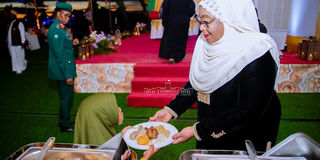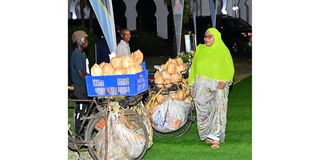Prime
Underprivileged slum dwellers deserve Ramadhan compassion too

President Samia Suluhu Hassan serves an iftar meal to a 6-year-old orphan, Shuraiya Ramadhan from the Rahman orphanage centre in Dodoma, at the Chamwino State House in Dodoma today on March 27, 2024. PHOTO | STATE HOUSE
What you need to know:
- It is believed that feeding someone iftar as a form of Sadaqah, Zakat, or, charity, is very rewarding and that such was practiced by the Holy Prophet Himself.
The Holy Month of Ramadan for this year, 2024, has come to an end, and we are celebrating Idd el Fitr. Ramadan is the 9th month in the Islamic lunar year, and it is the month in which the Holy Qur’an was first revealed. It is a month of fasting from dawn to dusk. As it is written: “You may˺ eat and drink until you see the light of dawn breaking the darkness of night, then complete the fast until nightfall” (Surah Al-Baqarah - 183-187).
As Ramadan is also the month of almsgiving, many people organise iftar dinners for the poor, students, guests, and foreigners. Iftar (also known as Eftari or, Iftor) is the fast-breaking evening meal of Muslims in Ramadan. This is their second meal of the day as the daily fast during Ramadan begins immediately after the pre-dawn meal of suhur and continues during the daylight hours, ending at sunset with the evening meal of iftar.
Iftar is one of the religious observances of Ramadan, and is often done as a community.
It is however sad that this community practice is weakening in many neighbourhoods where gated communities prevail.
It is believed that feeding someone iftar as a form of Sadaqah, Zakat, or, charity, is very rewarding and that such was practiced by the Holy Prophet Himself.
According to UNESCO, iftar is observed by people of all ages, genders and backgrounds, and marks the daily termination of the hardships of fasting from dawn to sunset. The evening prayer is followed by activities such as praying ceremonies, music, storytelling, games, preparing and serving traditional and local meals and marriage arrangements.
For communities, it often takes the form of gatherings or meals, strengthening family and community ties and promoting charity, solidarity and social exchange.
The ceremonies and rituals related to Iftar are also practised by people who do not necessarily fast during the month of Ramadan.
Iftar is often supported by governmental entities, NGOs and charities, as well as through television, radio, press and social media.
Indeed, we saw, here in Tanzania at the beginning of Ramadan, that the President hosted iftar for a large gathering of people, at State House.

The fact that coconut sellers were pictured talking to the President during that iftar is a clear indication that peoples of all kinds were invited to that event.
Other organisations have hosted iftar for their clients or stakeholders in different parts of the country. Most of these have been hosted at some prominent venue such as hotels and restaurants.
I wonder whether anybody remembered the underprivileged in our urban areas, living in unplanned areas, slums and flood-prone areas.
The purpose of this article is to point out that the majority of urban residents live and earn their livelihoods in unplanned areas.
Many of them fast, as best as they can. It is time government entities organized iftar in various parts of unplanned areas. The venue could be a local school, a local health centre, or a local open space, should there be one.
Besides the religious aspects of iftar, the gathering could be used to discuss community development in these areas; to discuss how the living conditions in such areas could be improved; or, how existing facilities could be maintained for the better of the community.
People in such areas are highly unlikely to be invited to iftar gatherings in fancy venues like hotels, which are, in any case far from where they are living.
They may also be unable to identify themselves with the invitees at such gatherings. The best they can do is to enjoy the iftar and trudge back to their ghetto life.
Why can’t iftar be organized to take place in their own neighbourhoods? If they cannot go to iftar, let iftar go to them.
Iftar has gained worldwide significance. Last year, in 2023, UNESCO, the United Nations Educational, Scientific, and Cultural Organisation, added iftar to its list of Intangible Cultural Heritage.
This intangible cultural heritage can also be harnessed to play a part in contributing to community development ideas and activities in the unplanned areas or urban areas whether the majority of the under-privileged live.
The call is that come next Ramadan, government entities, NGOs and charities should be prepared to host iftars in the neighbourhoods where the poor live and use the opportunity to discuss development.
Idd Mubarak!





